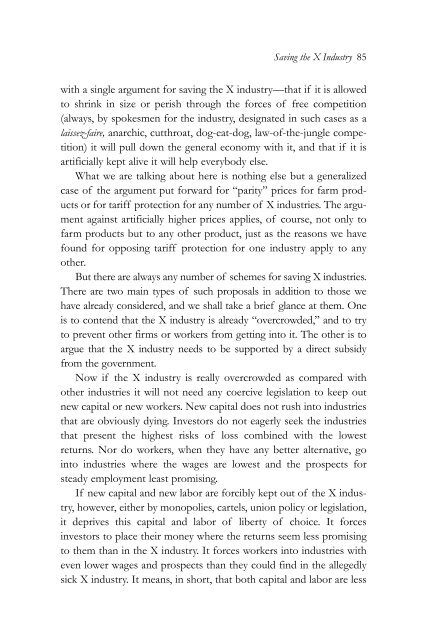1gDdM7w
1gDdM7w
1gDdM7w
- No tags were found...
You also want an ePaper? Increase the reach of your titles
YUMPU automatically turns print PDFs into web optimized ePapers that Google loves.
Saving the X Industry 85with a single argument for saving the X industry—that if it is allowedto shrink in size or perish through the forces of free competition(always, by spokesmen for the industry, designated in such cases as alaissez-faire, anarchic, cutthroat, dog-eat-dog, law-of-the-jungle competition)it will pull down the general economy with it, and that if it isartificially kept alive it will help everybody else.What we are talking about here is nothing else but a generalizedcase of the argument put forward for “parity” prices for farm productsor for tariff protection for any number of X industries. The argumentagainst artificially higher prices applies, of course, not only tofarm products but to any other product, just as the reasons we havefound for opposing tariff protection for one industry apply to anyother.But there are always any number of schemes for saving X industries.There are two main types of such proposals in addition to those wehave already considered, and we shall take a brief glance at them. Oneis to contend that the X industry is already “overcrowded,” and to tryto prevent other firms or workers from getting into it. The other is toargue that the X industry needs to be supported by a direct subsidyfrom the government.Now if the X industry is really overcrowded as compared withother industries it will not need any coercive legislation to keep outnew capital or new workers. New capital does not rush into industriesthat are obviously dying. Investors do not eagerly seek the industriesthat present the highest risks of loss combined with the lowestreturns. Nor do workers, when they have any better alternative, gointo industries where the wages are lowest and the prospects forsteady employment least promising.If new capital and new labor are forcibly kept out of the X industry,however, either by monopolies, cartels, union policy or legislation,it deprives this capital and labor of liberty of choice. It forcesinvestors to place their money where the returns seem less promisingto them than in the X industry. It forces workers into industries witheven lower wages and prospects than they could find in the allegedlysick X industry. It means, in short, that both capital and labor are less


